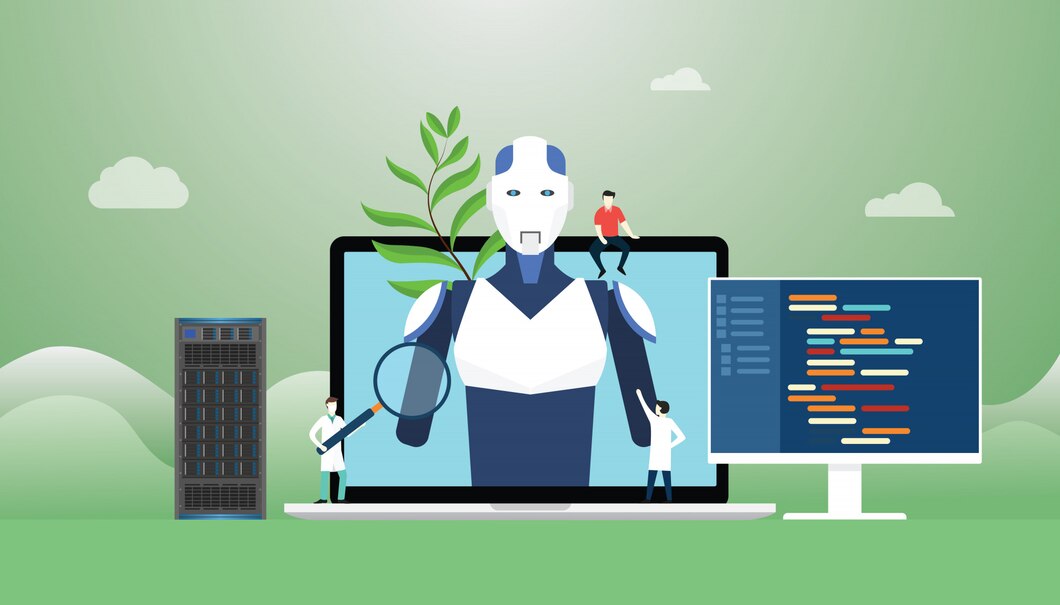


Web development is of paramount importance to programmers as it empowers them to create the digital landscape upon which our modern world relies. It is the foundation upon which websites, web applications, and online services are built, enabling businesses to reach global audiences, individuals to express themselves, and organizations to streamline operations. Programmers play a pivotal role in this ecosystem, utilizing their coding expertise to craft interactive, user-friendly, and secure web experiences. The synergy between website development and programmers drives innovation, facilitates e-commerce, enhances user connectivity, and ensures the robust functionality of the internet, making it an indispensable partnership in the digital age.
AI has made significant advancements in recent years, and it's true that it can automate many tasks traditionally performed by programmers. However, there are several reasons why AI is unlikely to completely replace programmers:
Programming often requires creative problem-solving and innovative thinking. While AI can assist in generating code based on patterns and examples, it typically lacks the ability to come up with entirely new and groundbreaking ideas.
Many programming tasks involve making complex decisions based on various factors, including project requirements, user needs, and business goals. AI may struggle to make these high-level decisions effectively without human guidance and context.
Programming often involves ethical and moral considerations, especially when developing applications that impact people's lives. Decisions about how to handle sensitive data, address bias, and ensure user safety require human judgment and empathy.
AI systems lack a deep understanding of the context in which they operate. They may generate code that works in specific scenarios but fails to adapt to changing requirements or unexpected situations. Programmers can adapt and evolve their solutions based on real-world feedback and changing circumstances.
Programming is not just about writing code; it also involves effective communication with team members, stakeholders, and clients. Human programmers can understand and respond to non-technical aspects of projects, such as client preferences, team dynamics, and project management.
The development of AI itself requires skilled programmers. Creating and training AI models, fine-tuning algorithms, and maintaining AI systems all depend on human programmers.
AI can assist with some aspects of debugging, but it's often human programmers who need to diagnose and fix complex issues in software systems. Maintenance and long-term support of software also rely heavily on human intervention.
Real-world applications frequently encounter edge cases and unpredictable scenarios that can be challenging to handle. Human programmers can use their judgment and expertise to address these situations effectively.
Ensuring that software complies with legal and regulatory requirements is a complex task that demands a deep understanding of both the code and the legal framework. AI cannot replace the need for legal and compliance experts in software development.
The field of programming is continually evolving, with new languages, frameworks, and technologies emerging regularly. Programmers must stay up-to-date with these changes and adapt their skills, something that AI cannot do on its own.
While AI can automate certain programming tasks and make developers more efficient, it is unlikely to replace programmers entirely. Human programmers bring a unique set of skills, including creativity, judgment, empathy, and adaptability, that are essential for many aspects of software development. AI and automation can be valuable tools for programmers, augmenting their abilities and streamlining certain tasks, but they are unlikely to replace the need for human programmers in the foreseeable future.
While AI has made significant strides in automating certain aspects of web development, it's unlikely to completely replace web developers. Web development involves not just writing code but also creative problem-solving, understanding user needs, and adapting to evolving design trends and technologies. Human web developers provide a crucial human touch in crafting user experiences, ensuring accessibility, addressing unique project requirements, and collaborating with clients and teams. AI can assist in automating repetitive tasks and generating code snippets, but the nuanced decisions, creativity, and adaptability that web development often requires are areas where human developers continue to excel and are likely to remain indispensable.
The choice between learning AI or web development depends on your interests and career goals. Before going further, it is better to know the basic concept of web development first. If you're passionate about creating websites, web applications, and user interfaces, then web development is a solid choice. It offers numerous opportunities in industries such as e-commerce, entertainment, and information technology. On the other hand, if you're intrigued by machine learning, data analysis, and the potential of AI in fields like healthcare, finance, or autonomous systems, pursuing AI could be a rewarding path. Consider your personal interests, long-term career aspirations, and the specific skills and roles you find most appealing when making this decision. Both AI and web development offer promising career prospects, so it's about aligning your learning with your passion and goals.
